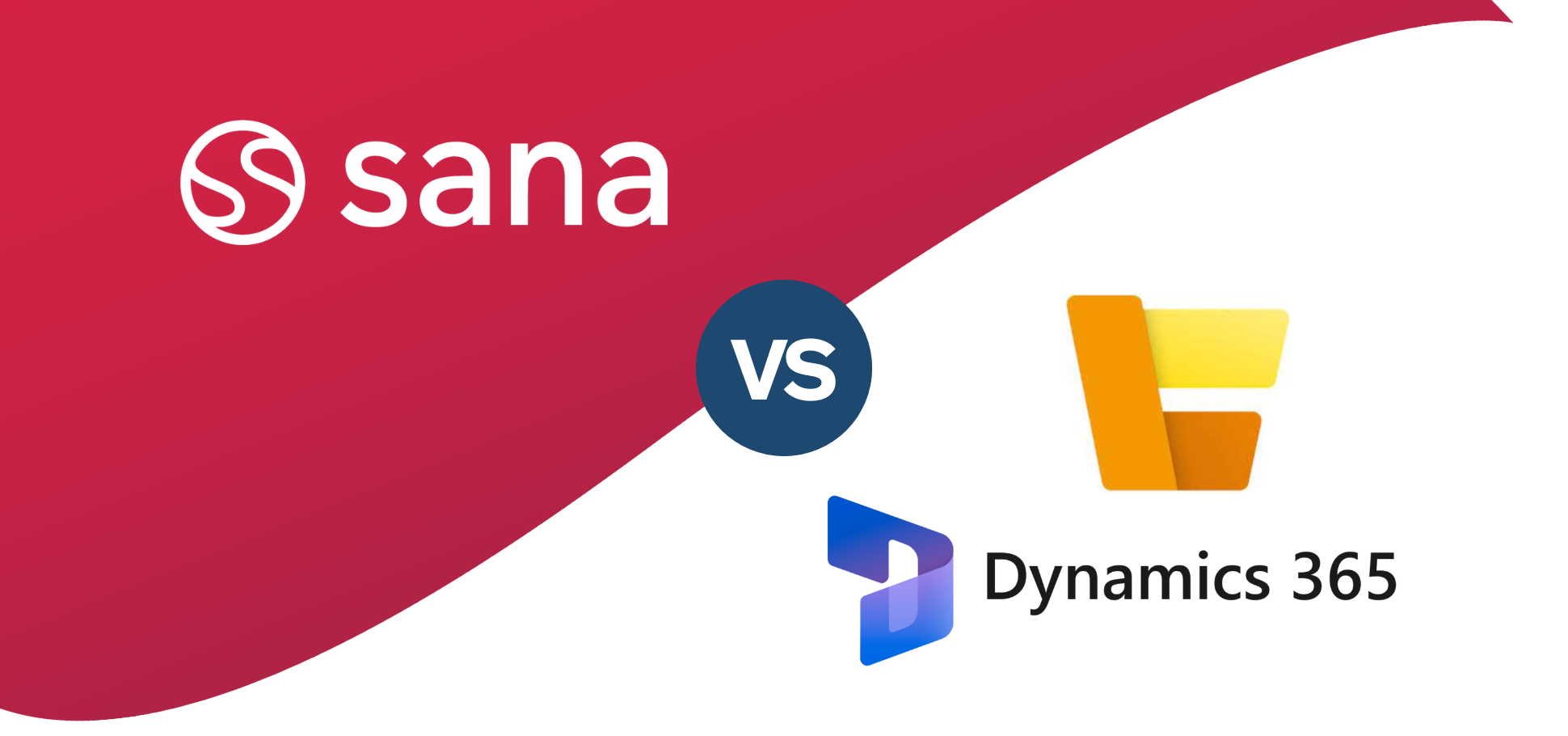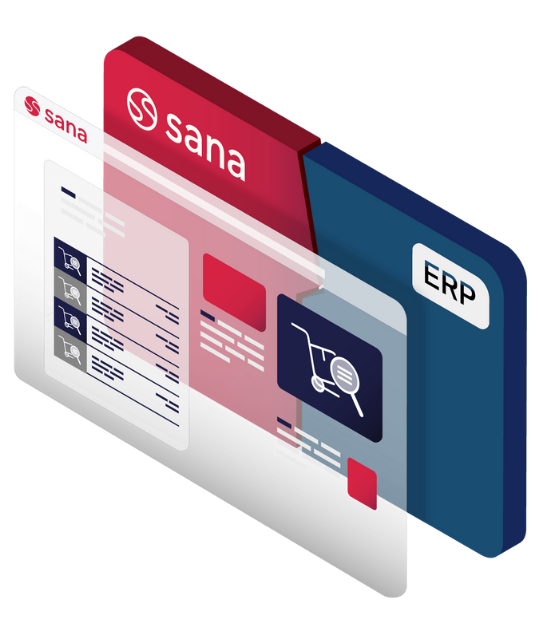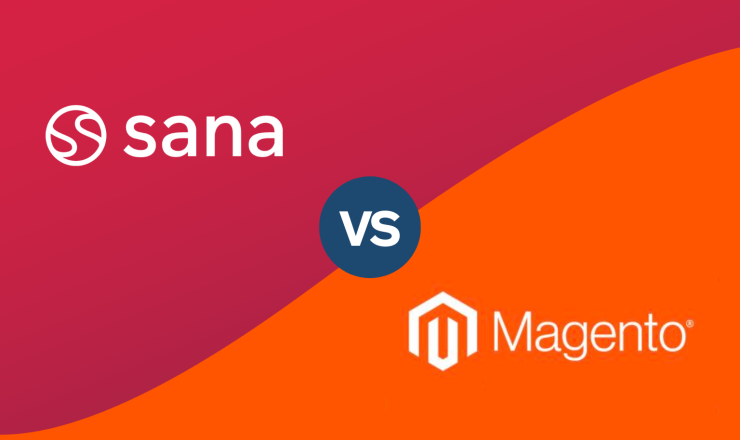

Choosing the right e-commerce solution that integrates with your ERP is not a task you do with your eyes closed. It’s important to dive into each platform to understand what features you get and if they work with your organization’s needs.
Sana Commerce Cloud has always focused on a seamless integration that uses your ERP to power your web store.
Recently, Microsoft has been touting Microsoft Dynamics 365 Commerce — a point of sale e-commerce solution that has some newly added B2B e-commerce functionality.
But how does this added B2B functionality compare to the Sana Commerce Cloud — a dedicated B2B e-commerce solution?
Which solution is more integrated with your ERP? Which solution has the most features?
Which solution is better for you?
Microsoft D365 Commerce: What do they promise?
Microsoft D365 Commerce markets itself as an omnichannel e-commerce solution that fits within the greater Microsoft Dynamics family. Microsoft already provides a host of enterprise resource planning (ERP) solutions — solutions that unify your back-end systems such as manufacturing, inventory and accounting.
Like Sana Commerce, Microsoft D365 Commerce connects with your ERP to power your web store.
Now, with D365 commerce, they are promising that you can simply move that back-end information from your Microsoft ERP to your new Microsoft web store.
That’s the sell — that you can do your entire business cycle without leaving the Microsoft suite. But how well does this system function?
D365 Commerce (formerly D365 Retail) historically was focused on point-of-sale and physical locations; this is a B2C-focused software. However, Microsoft has begun to focus attention on its new B2B capabilities, such as order templates and online invoice payment.
But just because Microsoft D365 has added some B2B functionality does not make it a B2B-focused solution. At its heart, D365 is an omnichannel solution with a strong B2C bias.
Microsoft D365 Commerce: Where it comes up short
D365 Commerce has a compelling promise: that your ERP and your web store will be integrated within the same Microsoft family. It markets itself as an all-inclusive, omnichannel solution. But there are significant drawbacks you need to be aware of before you lock into this solution.
Your systems won’t be synced in real time
Microsoft D365 Commerce has to get your data from the back-end (your ERP) to the front-end (your web store). Your web store needs to know how many stock units you have on hand. Similarly, your ERP needs to know when purchases have been made so it can update your totals.
Microsoft solves this problem by using a commerce scale unit — a piece of software that ferries that critical data back and forth.
Here’s the problem — that ferrying doesn’t happen instantaneously. That means that data gets out of alignment. What does Microsoft do to fix this? They estimate your stock on hand. They guess. Look at what Microsoft has to say about this:
“It’s critical to understand that all on-hand availability data that is provided during the operational day is considered an estimated value.”
“If you try to compare the on-hand inventory information that the application provides with actual physical inventory on the shelves, or if you try to compare the on-hand values that are shown in POS with the on-hand data that you find for the same warehouse in headquarters, the values might differ.”
The values might differ.
That’s a pretty big risk for businesses that rely on accuracy.
In today’s unpredictable environment, with volatile raw material prices and constricted supply chains, having accurate stock and pricing data is essential. Estimation isn’t acceptable.
The software is complicated
Microsoft Dynamics 365 Commerce has a lot of moving parts. To connect your business logic to your e-commerce web store, they use a piece of middleware — commerce scale unit (CSU).
The CSU additionally connects with POS systems and third-party services like shipping providers.
This added middle layer stores a copy of the data from your ERP — it doesn’t pull it directly. This data storage can grow exponentially, costing valuable resources.
Having all of these disparate systems means that making an update or customization requires modifying all of these systems separately. Instead, you’ll need to go through the time-consuming process of making the changes to each system.
Are you willing to tie up your time and capital in these redundancies?
You’re locked and limited
When you commit to D365 Commerce, you lock yourself into the Microsoft Ecosystem.
Your internal business logic? Microsoft powered.
Your web store? Microsoft powered.
Your POS? Microsoft again.
Disentangling yourself from this ecosystem — when problems arise — becomes increasingly difficult as you rely more heavily on one company to provide all of your services.
And we’ve discovered that the services D365 Commerce provides can be surprisingly sparse.
- D365 Commerce only supports one payment provider: Adyen.
- D365 Commerce only supports one shipping add-on: FedEx.
If you want the flexibility to choose your shipping partner or your payment partner, you won’t find it on D365.
Bottom line: Microsoft Dynamics 365 Commerce is a B2C solution with a B2B coat of paint
D365 calls itself an omnichannel e-commerce solution. What that really means is that it’s a B2C-focused platform that has added some limited B2B functionalities. For B2C businesses, the 365 ecosystem holds merit. But for robust B2B businesses, this solution comes up short.

Sana Commerce Cloud: An integrated e-commerce solution for B2B businesses
Our premier product, Sana Commerce Cloud (SCC), is engineered to be an elegant and agile B2B e-commerce solution. Instead of complicated software, middleware and data redundancies, we provide an elegant solution that seamlessly integrates with your ERP to power your web store or B2B portal.
1. We have a simplified architecture
We don’t have a CSU. We don’t have redundant middleware.
Here’s how Sana Commerce Cloud works: Our software integrates natively with your ERP, drawing data to your web store without duplication. No expensive storage, no estimated values. Your ERP is your single source of truth, and Sana Commerce Cloud ensures that your web store reflects that truthful data in real time.
2. We’re faster and we provide greater ROI
Microsoft Dynamics 365 Commerce is not quick to deploy. They do not provide a starter site or implementation services, which means that it takes far longer to get your e-commerce solution up and running.
Sana Commerce Cloud, on the other hand, can go live more quickly. That means you’ll start reaping the benefits of your e-commerce solution faster.
Additionally, while D365 has some low-cost solutions, we’ve found that if your business performs at least 3,000 transactions per month, SCC provides greater ROI.
For B2B businesses that have significant transaction volume, or are scaling upwards, our B2B portal provides the most return.
3. We are in the B2B business
Sana Commerce provides features that B2B businesses need. We have a family of add-ons that enable multiple shipping options. We provide over a dozen payment service providers (PSP), including our own — Sana Pay.
We are designed to make e-commerce ordering for B2B businesses simple and cost-effective.
Microsoft D365 Commerce, which markets itself as an omnichannel solution, is significantly more B2C focused. Fewer shipping options, fewer PSPs and reduced ROI for higher transaction volume — theirs is a B2C solution with a B2B coat of paint.
An e-commerce solution built for B2B success
Sana Commerce Cloud is a dynamic e-commerce platform — one that doesn’t lock you into a static and restrictive ecosystem. We are designed to help manufacturers, distributors and wholesalers succeed by fostering lasting relationships with customers who depend on them.
D365 promises an integrated solution that gives you B2B support. However, they use complicated and convoluted middleware and expensive data replication to meet this claim. This redundant system isn’t truly integrated and leaves you with inaccurate inventory — a serious business risk.
Alternatively, Sana Commerce Cloud uses your existing ERP as the single source of truth for all data in your web store. Our elegant e-commerce solution makes your ERP and e-commerce work as one. This eliminates system silos, unnecessary complexities and compromises.
Our e-commerce solution scales with your business, nimbly enabling you to achieve e-commerce success.




